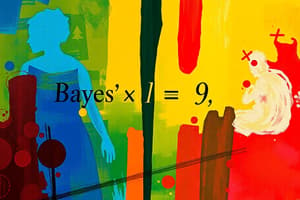Podcast
Questions and Answers
What is the formula for Bayes' theorem?
What is the formula for Bayes' theorem?
- P(A|B) = P(B|A) * P(B) / P(A)
- P(B|A) = P(A|B) * P(B) / P(A)
- P(B|A) = P(A|B) * P(A) / P(B)
- P(A|B) = P(B|A) * P(A) / P(B) (correct)
In Bayes' theorem, what does P(A|B) represent?
In Bayes' theorem, what does P(A|B) represent?
- Probability of both events A and B occurring together
- Probability of event A occurring given that event B has occurred (correct)
- Probability of event B occurring given that event A has occurred
- Probability of either event A or event B occurring
What does Bayes' theorem provide a way to calculate?
What does Bayes' theorem provide a way to calculate?
- The conditional probability of one event given the occurrence of another event (correct)
- The probability of either event occurring
- The probability of both events occurring together
- The absolute probability of an event occurring
In Bayes' theorem, what does P(B|A) represent?
In Bayes' theorem, what does P(B|A) represent?
Flashcards are hidden until you start studying




